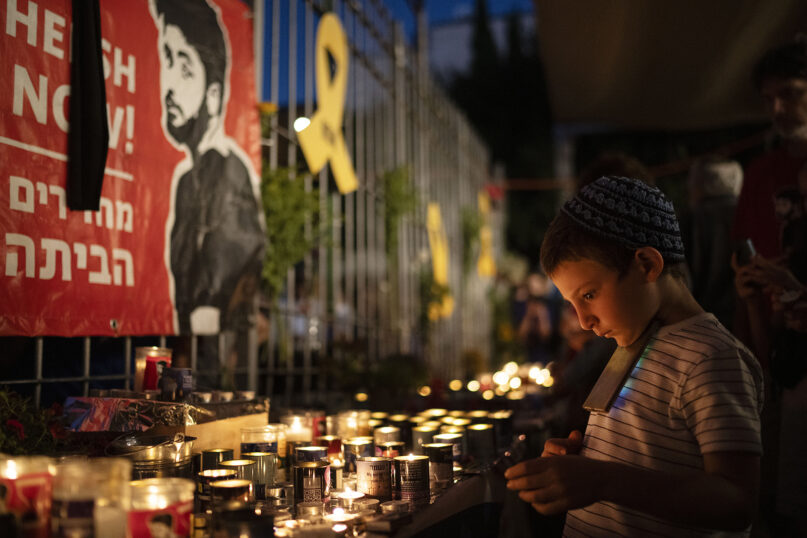(RNS) — American Jews breathed a collective sigh of relief Wednesday (Jan. 15) when the ceasefire deal was announced 15 months after the war between Israel and Hamas began.
Every American Jewish organization celebrated the deal, which Israel’s government is expected to sign on Friday. Many American Jews have prayed fervently for the release of all 250 hostages abducted by Hamas fighters from Israel on Oct. 7, 2023.
About 100 or fewer hostages remain in Gaza; of those, seven are dual Israeli American citizens, and only three of the seven are believed to be alive.
According to the terms of the ceasefire, its initial phase involves the release of 33 hostages and hundreds of Palestinian prisoners.
Among those 33 hostages are women and children, men over age 50 and sick or wounded people. That includes at least two hostages with American citizenship. Among them is Keith Siegel, 66, who grew up in Chapel Hill, North Carolina, but has been living on Kibbutz Kfar Aza, close to the Gaza border, for the past four decades. He and his wife, Aviva Siegel, were both taken hostage on Oct. 7, 2023. She was released 52 days later in an earlier temporary ceasefire deal.

Edan Alexander. (Courtesy photo)
Also likely to be released is Sagui Dekel-Chen, 36, of Kibbutz Nir Oz. Dekel-Chen, whose parents are American citizens, is the father of three girls, one of whom he has never met. She was born after he was taken hostage. He is thought to have been wounded on Oct. 7 and therefore qualifies to be among those released.
RELATED: For Israeli Jews, a potential ceasefire brings both hope and fear for the future
One other American citizen is among the group: Edan Alexander, 20, of Tenafly, New Jersey.
Alexander, whose parents are Israeli-born and who himself was born in Israel, enlisted in the Israeli army after graduating from Tenafly High School. He has lived most of his life in the U.S. But because he is a soldier and young, he may not be among those 33 scheduled to be released in the first phase of the ceasefire. On Nov. 30, Hamas released an undated video, posted on the secure messaging service Telegram, showing Alexander.
Under the terms of the ceasefire, Israel must free multiple Palestinian prisoners for each Israeli hostage. It must also allow more than 500 trucks of humanitarian aid to be delivered to Gaza every day.
Four other Israeli American hostages are thought to be dead. Their bodies will be returned only during a later phase of the ceasefire deal. They include Itay Chen and Omer Neutra, two Israel Defense Forces soldiers who are confirmed dead, and Gadi Haggai and his wife, Judi Weinstein, of Kibbutz Nir Oz. The couple were killed by Hamas militants on Oct. 7, and their bodies dragged to Gaza.
The best-known of the Israeli American hostages, Hersh Goldberg-Polin, was captured by Hamas at the site of the Nova music festival near Gaza. He was killed after 11 months of captivity and his body was returned to Israel in August.

People light candles during a vigil in memory of slain hostage Hersh Goldberg-Polin in Jerusalem, Sept. 1, 2024. (AP Photo/Leo Correa)
Families of the Israeli American hostages have been meeting as a group since their loved ones were taken. They have formed a tight bond, communicating daily on a WhatsApp group chat and getting weekly Zoom updates from State Department officials.
Among them is Liz Hirsh Naftali, an Israeli American who remains part of the group even after the release of her great-niece, Abigail Mor Idan, who was held hostage in Gaza and released in November 2023.
“We’ve all been told there’s a deal,” Naftali said. “Right now everybody is just waiting to see who will be on that list. There’s been a very good relationship between the Biden and Trump administration. They’re working in collaboration, which is very good. We are going to need continuing leadership of President-(elect) Trump to ensure that this deal goes through so that all the Americans go out.”
RELATED: Netanyahu says ‘last-minute crisis’ with Hamas holding up approval of Gaza truce and hostage deal